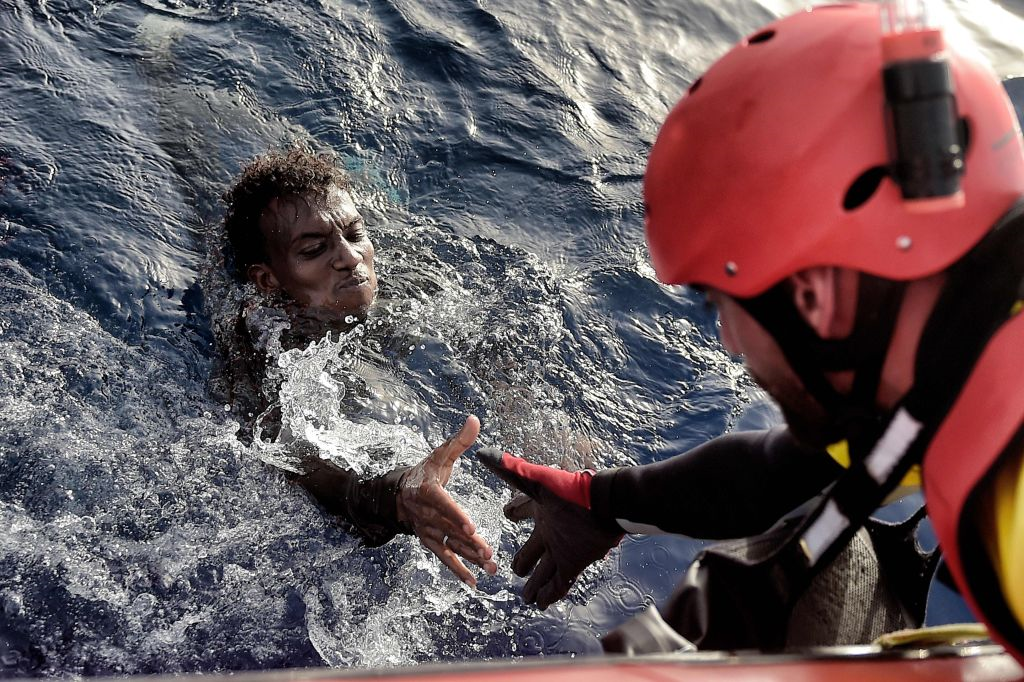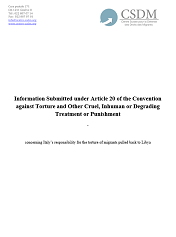The CSDM has submitted a formal request to the UN Committee against Torture to launch an inquiry procedure under Article 20 CAT concerning Italy’s conduct in the Central Mediterranean which is leading to the mass torture, rape and forced labour of thousands of refugees and migrants pulled back to Libya.
In our submission we argue that Italy’s strategy of outsourcing pull-backs to the Libyan Coast Guard (LCG) breaches Italy’s commitments under the Convention against Torture.
CSDM Submission to UNCAT
Background
For many years, there have been reliable reports of gross human rights abuses of migrants detained in Libya. These reports emanate from United Nations bodies (OHCHR and UNSMIL) and are echoed by NGOs active in the field of human rights (HRW, AI, MSF) and in search and rescue operations (Alarm Phone, Borderline Europe, Mediterranea – Saving Humans, Sea-Watch).
The Committee against Torture has itself found that Italy’s co-operation with Libya facilitates the torture of migrants by Libyan actors (CAT/C/ITA/CO/5-6, § 22).
Both Italian government and European Union officials have publicly acknowledged that this is happening. Several international bodies including the UNHCR, the IOM have called for an immediate stop to the disembarkation of rescued migrants in Libya. The Council of Europe Commissioner for Human Rights has called on Italy to halt cooperation with the Libyan Coast Guard.
The UN Special Rapporteur on Torture and other cruel, inhuman or degrading treatment or punishment has emphasised the legal liability of states for human rigths violations in the context of the externalization of border controls (A/HRC/37/50 §§ 54- 57).
Legal Submission
In our submission, we demonstrate that by pulling back migrants, the LCG is acting on Italy’s behalf. Specifically, it is operating due to Italy’s comprehensive material and logistical support which includes funds, ships, training, and command and control structures.
Real-time naval and aerial surveillance in the Central Mediterranean is provided by Italy directly and through EU programmes in which it participates. Cooperation between Italy and Libya is governed by a Memorandum of Understanding (MoU), a bilateral treaty signed in 2017 and renewed in 2020, whose stated purpose is to “stem illegal migration” through the provision of Italian resources to “the Libyan institutions in charge of the fight against illegal immigration” such as the “coast guard” (MoU Article 1).
Without these financial, material and policy resources, the Libyan authorities would not be able or willing to intercept migrant boats, or even to locate them in their own SAR zone. By means of this cooperation, Italy has entirely externalized its border control to Libya. This has led to the interception and forced return of an estimated 50’000 persons to Libyan torture camps since the cooperation began.
The shift from “push-backs” – involving Italy’s own navy and which were declared illegal by the ECtHR in the Hirsi Jamaa judgment – to “pull-backs”, where Italy outsources the very same activity to the Libyans, constitutes a naked attempt to avoid accountability under human rights law.
However, as we demonstrate in our submission, Italy’s involvement with the LCG is so comprehensive, that Italy has itself become responsible for the LCG’s conduct under applicable principles of international law. Because of Italy’s decisive role over all aspects of Libya’s interdiction programme, Italy is exercising de facto control over migrants in the Central Mediterranean and its actions therefore come within the jurisdictional scope of the Convention against Torture to which Italy is a party.
The Committee against Torture is charged with supervising state compliance with the Convention against Torture including by opening a formal inquiry procedure under Article 20 concerning situations which reveal a systematic practice of torture by a state party. In light of the information submitted, we urge the Committee to start an investigation that will establish the facts and the legal responsibilities of Italy, and recommend the immediate cessation of all collaboration with Libyan migration authorities implicated in abuses of refugees and migrants.



